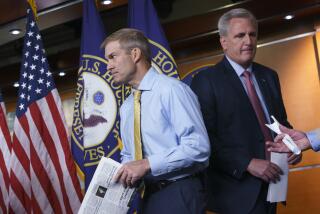PERSONALITIES IN THE NEWS : Christopher, Jordan Weave Law, Civic Duty : Transition: The lawyers share histories of public service. Christopher is known for L.A. police reform panel. Jordan has worked for civil rights.
- Share via
LITTLE ROCK, Ark. — Six months ago, as he neared the end of his quest for the Democratic presidential nomination, Bill Clinton turned to Warren Christopher and Vernon E. Jordan Jr. to help him find a running mate. On Thursday, he again turned to the pair, this time to help him build a government.
The appointments of Christopher and Jordan to head Clinton’s transition team--formally decided upon and announced here Friday--marked another milestone in the careers of two lawyers who have long worked at the intersection of government, politics and the law.
For Christopher, 67, the assignment may serve as the capstone in a career that has included numerous sensitive posts, most recently as head of the commission formed to investigate the Los Angeles Police Department following the beating of motorist Rodney G. King by four of its officers. The commission concluded that the department was plagued by racism and mismanagement.
Christopher’s name has figured widely in speculation about candidates for secretary of state in a Clinton Administration. But at a news conference here after his appointment was announced, Christopher said that taking the transition job would preclude his seeking a government post.
But Christopher, who will be based in Little Rock and have day-to-day operational control of the transition team, pointedly said he hoped the same bar would not apply to Jordan, 57, who has been widely seen as a possible attorney general in a Clinton Cabinet. Jordan will serve as the overall chairman of the transition, a post with less direct involvement in the selection of future officeholders than Christopher’s position.
Asked during a brief news conference in Washington whether he would rule himself out for an Administration post, Jordan demurred. “I’ll cross that bridge when I come to it. That’s not my choice, that’s (Clinton’s) choice. I have only one objective, and that objective is a smooth transition.”
A large, imposing figure--well over 6 feet tall and weighing 230 pounds--Jordan is a forceful public speaker and occasionally intimidating presence, say those who have seen him in action.
For the past decade, he has worked as a partner in Akin, Gump, Hauer & Feld, the Dallas-based law firm whose Washington office was long headed by Robert S. Strauss, Washington’s premier lobbyist and Democratic political fixer until President Bush named him ambassador to Moscow. As such, Jordan is a leading member of the elite of lawyer-lobbyists who form the core of the permanent Washington Establishment and possess a blue-chip roster of clients and memberships on corporate boards.
Publicly, however, he remains far better known for his previous career as one of the country’s leading civil rights leaders.
From 1972 until 1981, Jordan headed the National Urban League. Before that, he served as executive director of the United Negro College Fund, director of the Southern Regional Council’s Voter Education Project and head of field efforts in Georgia for the National Assn. for the Advancement of Colored People during the height of the civil rights movement.
Although Clinton aides stressed that the President-elect turned to Jordan for qualities of judgment and political skill that transcend race, they also say Clinton wanted to use the appointment to signal his commitment to a racially diverse Administration.
“I’m sort of a living example,” Jordan said in a Washington tele vision interview Friday night. “I’ve spent my life in equal opportunity. I believe in it. Bill Clinton believes in it . . . and Warren Christopher believes in it. We’ll have a diverse Cabinet here.”
While serving as the Urban League’s president, Jordan made a widely publicized speech in 1984 denouncing then-President Ronald Reagan for policies that, he said, had “constructed an Iron Curtain between black Americans and his Administration.” Reagan’s Administration, he said at the time, had been “the most hostile to black people and black aspirations since Woodrow Wilson.”
In the same year, he made another closely analyzed speech urging Jews and blacks to put aside the bitterness that had developed because of controversial remarks about Jews made by the Rev. Jesse Jackson during his 1984 presidential campaign.
The speech reflected Jordan’s ties to two of the Democratic Party’s most loyal constituency groups--groups that often have been at odds in recent years--and also resembled appeals that Clinton made during the campaign for blacks and Jews to reconcile.
Racial relations also have been one focus of Christopher’s career. In 1965-66, he served as vice chairman of the McCone Commission, set up to investigate the causes of the 1965 Watts riots. That helped make him a logical choice to head the panel Los Angeles Mayor Tom Bradley formed shortly after the March, 1991, police beating of King was captured on videotape and replayed around the world.
The Christopher Commission’s recommendations formed the basis of the charter amendment adopted by voters earlier this year to change the Police Department’s structure and its relationship with the community.
Like Jordan, Christopher represents a slice of the American legal Establishment and its frequent intersection with public service. A one-time law clerk for the late Supreme Court Justice William O. Douglas, he is now chairman of O’Melveny & Myers, one of Los Angeles’ best-known law firms.
Christopher’s chief interest outside of his law practice has been foreign affairs. As deputy secretary of state in the Carter Administration, he was the chief negotiator responsible for forging the deal with Iran that ultimately led to the 1981 release of 52 Americans held prisoner in the U.S. Embassy in Tehran.
Carter, in his memoirs, called Christopher “the best public servant I ever knew.” Carter awarded him the Medal of Freedom, the nation’s highest civilian award, shortly before leaving office in recognition of his work.
More to Read
Get the L.A. Times Politics newsletter
Deeply reported insights into legislation, politics and policy from Sacramento, Washington and beyond. In your inbox twice per week.
You may occasionally receive promotional content from the Los Angeles Times.











